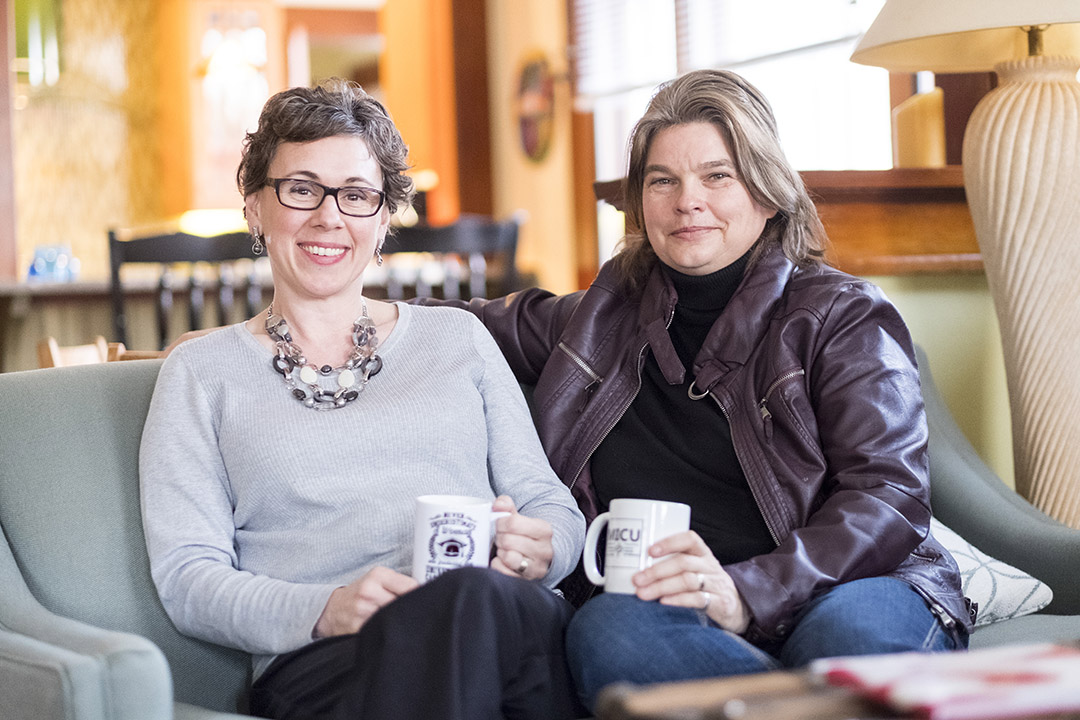
Beyond the rainbow
U of S alumni are planting new flags for LGBTQ advocacy.
By HenryTye GlazebrookA call to mobilize
It all started with then-Minister of Justice Frank Quennell, his voice buzzing over CBC radio airwaves, declaring in 2004 that Saskatchewan had no plans to proactively pursue legalizing same-sex marriage.
The province would instead await the federal government’s ruling on the matter, he reported, but would not contest anyone who might challenge the law.
And for Kelley Moore (MA’13) and Lenore Swystun (MA’96), that statement may as well have come with a court summons.
“Lenore and I, being who we are, took that as a bit of a rally call to mobilize, to help them to change the law by giving them a reason to,” said Moore. “We had been together almost five years, and for us it was about equality and having the same rights as anyone else in a committed relationship.”
The resulting denial of a marriage license was the first step toward a courtroom, where Moore and Swystun would join four other couples in a landmark case that won same-sex partners across Saskatchewan their legal right to wed in November of that year.
It was hardly the first time either of them had stepped into the spotlight, forthcoming as they’d been in their relationship throughout their personal lives and even into Swystun’s time as Saskatoon’s first openly gay city council member, but the sheer magnitude of the decision to take action wouldn’t hit home until later.
“It was incredibly overwhelming to be in all these newspapers,” Moore said. “It’s one thing to be out within your own community and social circle, and then it’s another to be out across the entire country. It was probably the first time when I realized the importance of what we had done.”
The exposure proved good and bad, with friends and family coming forward in the days and months following. Sometimes they’d show support, sometimes they’d question their decisions. But the fallout was more than worth it to know Swystun and Moore had done something real to help others and to set the stage for those who would one day follow their tracks.
“We came on the shoulders and the backs of so many other couples before us,” Swystun said. “You’re always thankful that others had come before and opened a lot of gates and doors, and now we’re taking the next gate and door and hopefully opening it, too.”
A perfect, beautiful day
After their victory in court, Moore and Swystun waited two years as their lives returned to normalcy before tying the knot. They invited their closest friends and family members to a potluck in their backyard, hoping that a low-pressure affair would keep anyone from losing their invitation over politics.
“It was kind of funny because our one friend brought roses, my sister had a feeling something was up and she brought a gift, another friend brought a fruit cake and then we had a friend who was a United minister,” Moore said. “Between all of that we had the making of a wedding.
“It was a perfect, beautiful day.”
More than a decade later, both women see clearly that their win in court was only one step in the larger fight for equality. They see it when marginalized people of all kinds come to them for help finding work. They see it when clients Google their names and a look of shock spreads across their faces. They see it when they still have to plan trips abroad around which countries won’t turn them away at the border due to their sexual preferences.
But progress—large or small—is still progress, and they both know the best way to prevent slipping backward is to keep pushing forward.
“The work never stops,” Swystun said. “People think that once you get your driver's license or your marriage license that they’re there, but these are privileges. You have to continue to work on them to enshrine them as a privilege and as a right.”

